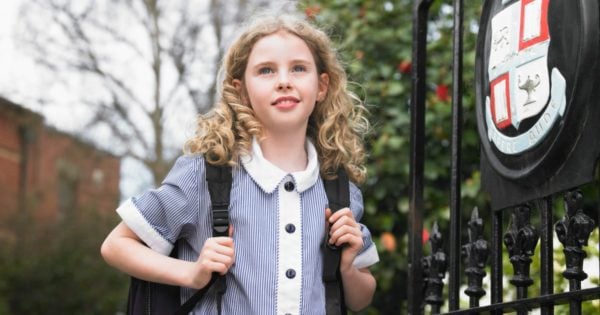
I went to an elite private school for my whole life. It worked for me, so I sent my child to a similar school.
When we moved interstate with only a term’s notice, we couldn’t secure a place in the one school we wanted. I saw that as an opportunity to broaden our experience – and so chose to do a year in a public school.
Because by then, I had started to suspect everything I so strongly believed about private education wasn’t necessarily true.
This is what I’ve discovered:
The standard of education is the same.
This was the biggest surprise to me – that all of that money hadn’t purchased a ‘superior’ academic education – or even a different one. Which of course, is a fantastic comment on the Australian public school system.
In private schools, there’s an expectation that parents are paying for more access to teachers, and more input into their child’s learning. I immediately found the staff and teachers were just as committed and available in our new school. I cannot speak highly enough of how easy the school made our transition from interstate.
I had been told to expect a knowledge gap between public and private, but there’s been no gap.
The access to resources is vastly different.
At our old school, there were twelve ovals on the property. Here, there isn’t even one. The school uses public parks for sporting activities.
There’s no indoor heated Olympic-sized swimming pool in the new school. There’s barely a semblance of a music program. And there’s certainly no French lessons.


Top Comments
My husband is a deputy principal in a large public high school, & I work in a small public primary school, our 3 kids have attended both our schools. We could not be prouder of our schools & what they offer the community.
Sure, we don't have the beautifully kept & immaculately mowed sporting ovals of the local elite private schools, but we are inclusive of everyone, no matter what you earn, whether you have a disability, or what your religious or cultural back ground is, nor your academic or athletic ability.
While no school is perfect, & we are always striving to better our schools for the benefit of students, I do think that there is often a misconception that public schools, & in particular, public high schools are less than ideal. Choose the school that works for you, by all means, but don't write off public schools as not being good enough. Some of the most passionate & dedicated teachers I've ever met, work in public schools.
I find the characterisation here of public schools (under resourced but well meaning kindly spaces encouraging mediocrity) against private schools (elitist, luxuriously appointed institutions only interested in stellar achievement) somewhat generalised and patronising. I live in an affluent part of a capital city with a wide variety of well established private, public and catholic schools. My children attend a primary school with a strong focus (and corresponding results) on academic challenge and achievement, music and, not that my offspring value it much, team sport. It is a pleasant physical environment although a lot is done with fundraising rather than drawing on capital expenditures funds. It is a public school. We originally intended to go private but an uncertain economy and some financial wobbles plus a desire to eat more than pet food when I retire has meant that we will enrol our children in the local high school which offers selections of various specialty programs. It has beautiful leafy grounds, new or refurbished buildings and its yr 12 results routinely meet or beat the neighbouring so-called elite co-Ed private school which also draws a lot of its students from our primary school. I don't kid myself that this public education is free or low cost as my mortgage has cost more than a R-12 private school experience for all 3 children but I will at least have a house and asset to sell when my children are starting uni or doing a gap year. I accept that this may not be a typical experience and I am relatively fortunate and privileged to have these options but my aim is to get commentators to consider how the broader demographics of a family and community influence the values and outcome of any school rather than falling back on tired stereotypes,